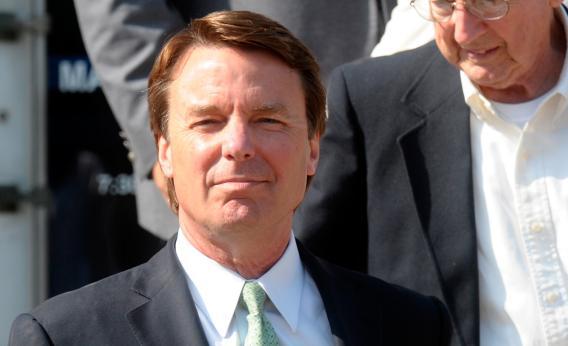Loathsome but not a criminal—that’s the glorious tagline John Edwards can write for his obituary now that the jury has found him not guilty on one of the six counts of violating campaign finance law that he faced, and hung on the rest. I suppose I should cheer the sputtering end to this trial, since charging Edwards always meant stretching the law. Yet somewhere along the way, I lost my appetite for railing against overzealous prosecutors. Not because Edwards behaved like an utter cad, though he did. But because in this election season in which politics is awash in money as never before, it was a small relief to imagine that someone, somewhere, could still get smacked for crossing the legal line.
Edwards was accused of violating campaign finance laws by taking nearly 1 million dollars from two rich pals, Bunny Mellon and Fred Baron, to keep his mistress, Rielle Hunter, from going off the reservation. Much of the money was spent after he dropped out of the race to be the Democratic candidate for president, but some of it came in while he was still in the running—Hunter, for example, moved into a home Mellon’s funds paid for in the fall of 2007 and got a BMW and credit cards. She also flew on Baron’s private jet in December to escape the wrath of Elizabeth Edwards, who by then knew about the affair. John Edwards dropped out of the presidential race in January 2008, and, as we all now know, he and Hunter had a baby a month later.
Did the Mellon and Baron gifts count as campaign donations, in which case they were far above the individual contribution limit of $2,300? That was the question at the heart of the indictment. The defense said Edwards was just getting private assistance from his friends. Here’s the legal definition of a campaign contribution: “Anything of value provided for the purpose of influencing the presidential election,” not including gifts that “would have been made irrespective of the candidacy.” How unhelpful—how to know which is what? As Richard Hasen has explained, in 2000 the Federal Election Commission issued an advisory opinion saying that if you’d given a candidate money before he was a candidate, you could keep giving above the limit—because of the pattern, your continuing donations would be considered personal. The Edwards defense team argued that Mellon and Baron had indeed given to Edward beforehand, and that this pattern canceled out the single sort-of smoking gun in the case: a note from Mellon written in April 2007 after Edwards took a beating for a $400 haircut. She wrote: “From now on, all hair cuts etc. that are necessary and important parts of his campaign … Please send the bills to me c/o Alex Farger in N. York. It is a way to help our friends without government restrictions.”
OK, fine, Mellon and Baron were friends, not donors—or friends as well as donors—and that was good enough for the FEC. An agency audit, issued after Edwards was indicted, treated the money Mellon and Baron gave as though it were for Edwards’ personal use, rather than requiring him to report it as a contribution. This meant that at the trial the prosecutors were forced to argue, “Whatever the F.E.C. determined is not relevant to the criminal charges.” Never mind that they were talking about a fellow federal agency’s determination on exactly the point crucial to deciding Edwards’ guilt.
For all these reasons, I understand why Hasen and many other observers wiser than me have argued that this prosecution was utterly misguided. “Criminal liability for campaign finance violations should be off the table except in the most concrete and egregious cases,” Hasen wrote in Slate a few months ago. “Otherwise, we risk deterring not just the unscrupulous, but also those who want to exercise their First Amendment rights by running for public office or supporting the candidates whom they believe will advance the public good.”
Right. Except that lately, I am so frustrated by the mockery that is campaign finance law in the wake of Citizens United and a key lower-court opinion that followed it, I’m having trouble remembering why we want to ensure that everyone can contribute freely to every campaign. Super PACs, Sheldon Adelson, Donald Trump—it’s these images that loom large at the moment, not disenfranchised voters trying to write their checks for $50. Against that backdrop, it is just hard to care about sparing John Edwards from strict enforcement of a confusing law. Maybe the FEC is wrong to exempt gifts from being campaign donations because of a past pattern of giving. Maybe we should have an individual contribution limit and stick to it.
On the other hand, when people and corporations and unions are spending hundreds of millions on elections through super PACs and issue-advocacy groups, that sounds quaint. So if I’m not cheering for John Edwards and his defense, I’m also not eager for the unlikely possibility that the prosecution will try again to convict him of the remaining five counts. He has suffered enough for our campaign finance sins. It’s time to move on from 2007 and his $900,000, and worry about the hundreds of millions pouring into this November’s election instead.
